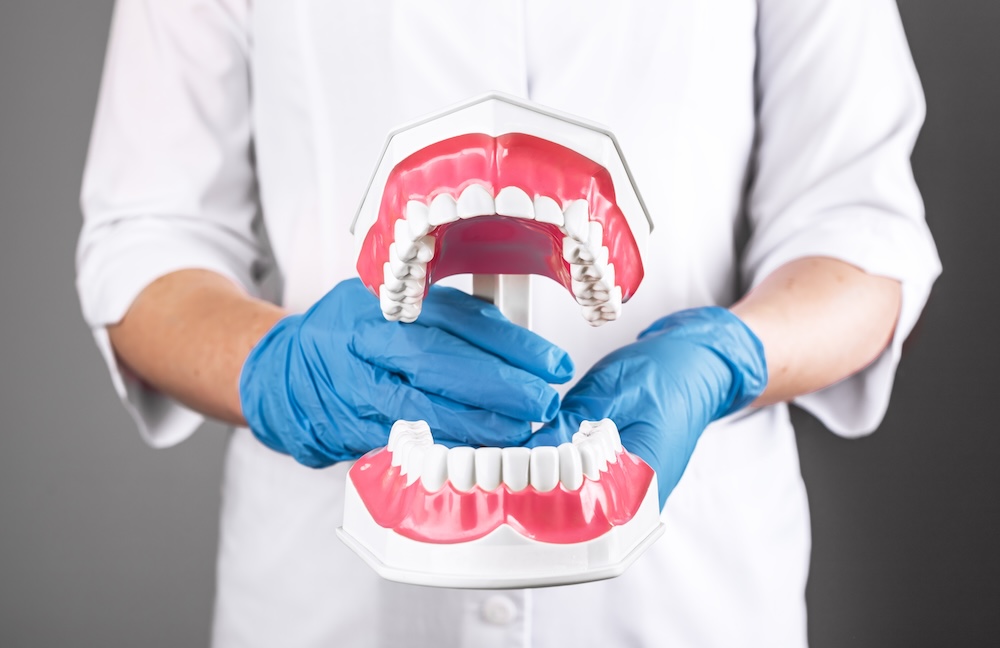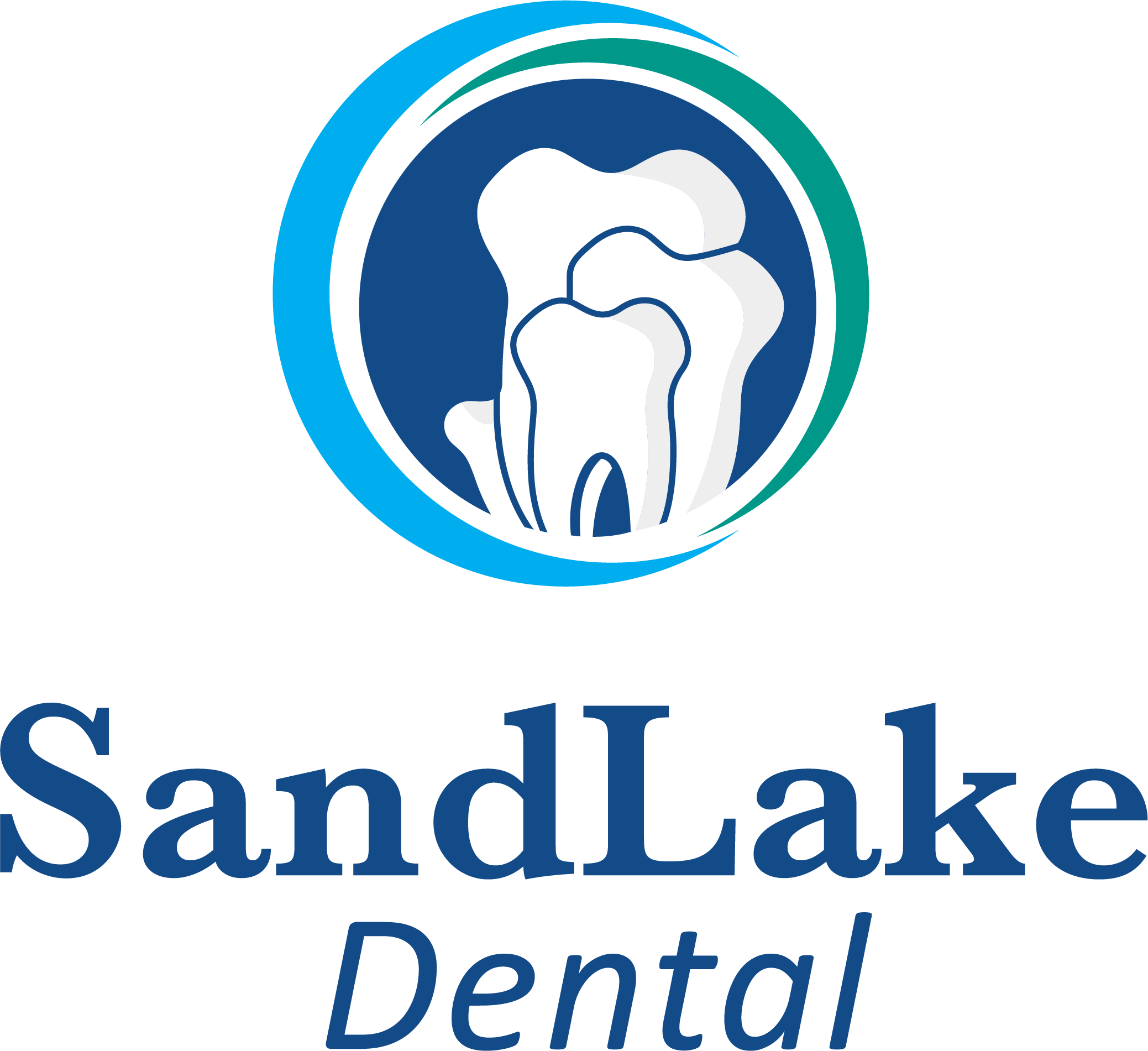
TMJ Treatment in Orlando, FL

Sand Lake Dental in Orlando provides advanced treatment for people with TMJ disorders. Our experienced dentists, Dr. Ziyad Maali and Dr. Stefhany Duque, offer many options to relieve pain and restore proper jaw function based on each patient’s unique needs. We utilize innovative technologies and therapies focused on reducing inflammation, easing muscle tension, stabilizing the joint, and preventing further damage.
Schedule a Consultation
What is TMJ?
TMJ is a joint connecting the lower jaw (mandible) to the skull. This critical junction allows the mouth to move up and down and side to side, enabling chewing, talking, yawning, and other essential functions. TMJs on both sides of the head work symmetrically to coordinate the opening and closing movements.
When somebody says that they have TMJ, they often refer to a disorder of the muscles, nerves, or other tissues in that joint. It may be difficult to identify the exact cause of this condition, but there are several potential culprits:
- Arthritis
- Jaw injury
- Teeth grinding or clenching
- Malocclusion (misalignment of the teeth)
- Stress
- Genetics
Common Symptoms of TMJ
While each TMJ disorder involves multiple symptoms, some patients may experience just one of them. Here are the common signs:
- Pain in one or both TMJs
- Clicking or popping when opening or closing the month
- Grating sensation when chewing or moving the jaw
- Locking of the joint that makes it difficult to open or close the mouth
- Aching pain near the ear
- Migraines or headaches


When do you need dentist?
While TMJ is usually temporary, patients should consider seeing Dr. Maali or Dr. Duque if their pain is persistent or they cannot open or close their jaw completely. Our experienced dentists understand the potential causes of TMJ disorders and provide the best treatments. Most patients can achieve pain relief without invasive procedures.
Request A Complementary Consultation
Our Treatments for TMJ
In many cases, TMJ disorders resolve without medication or treatment. For this reason, Dr. Maali and Dr. Duque may decide to hold off on doing anything and monitor the condition. However, if the symptoms are moderate or severe, they can offer several treatment options:
Medications
Different medications may be prescribed to address TMJ. These include pain relievers, anti-inflammatories, and muscle relaxants. Medications can reduce discomfort and swelling associated with TMJ. They also allow tensed facial muscles to relax and relieve pain in jaw joints.
Mouthguards Or Splints
Mouthguards and splints are common treatments for TMJ disorders. These custom-made devices fit over the teeth and position the jaw slightly forward to improve the alignment and function of the TMJ. This helps reduce pain, teeth grinding, jaw clenching, and other symptoms. Splints may be worn full-time initially and then only at night. Regular dental adjustments help optimize the fit.
Replacing Missing Teeth
When teeth are missing, it can cause a shift in the bite and alignment of the jaw. This imbalance may strain the TMJ and surrounding muscles, potentially leading to pain, limited motion, clicking/popping, and other issues. Our dentists can replace missing teeth with implants, bridges, or dentures, helping restore the proper bite alignment and take pressure off the TMJ.
Physical Therapy & Counseling
In combination with splinting techniques, physical therapy can help reduce muscle tension, alleviate pain, and prevent any other jaw difficulty. Counseling may also address habits like teeth clenching that lead to TMJ.
Referrals
If medications or other treatments do not resolve TMJ, we refer patients to transcutaneous electrical nerve stimulation (TENS) or surgery. These procedures can be helpful for people with severe symptoms. They address the problem at a deeper level.
Potential Candidates for TMJ Treatment
Because there are many potential causes of TMJ disorders, it is crucial to determine if the patient is predisposed to them. After that, we can take preventive measures before the condition becomes more serious. Some of the risk factors include:
- Family history of arthritis
- Traumatic injury to the jaw
- Chronic teeth-grinding or clenching
- Connective tissue disorders that may affect the temporomandibular joint
We always aim to address TMJ disorders on time to prevent joint deterioration and chronic pain. Dr. Maali and Dr. Duque offer the best treatments to achieve lasting results and improve the patient’s quality of life.
Benefits of TMJ Treatment
Reduces TMJ Pain
TMJ disorders may cause severe jaw pain that interferes with daily activities. Our treatments, like splints, therapies, and medications, can effectively reduce inflammation and aches in the jaw joints and muscles. When the source of the pain is addressed, most patients experience a significant decrease in TMJ symptoms.
Preserves The Jaw Joint
Without proper care, TMJ disorders may damage tissues over time. Our treatments stabilize the joint, promote healing, and prevent further deterioration. They preserve joint integrity and help patients avoid more invasive interventions later on.
Makes It Easier To Chew And Swallow
TMJ disorders frequently lead to difficulty and discomfort while chewing or swallowing. Our treatments improve jaw mobility so that the mouth can open wider. This makes activities like chewing solid foods or biting into an apple much easier and less painful. The reduction in aches and increased function make meals more enjoyable.
Decreases Headaches
Chronic headaches are a common symptom in many patients with TMJ disorders. They occur because the nerves, tissues, and blood vessels in the jaw joint and temples interact closely. Irritation in the TMJ area may trigger headaches or exacerbate existing migraines. We can resolve these problems with bite splints, physical therapy, or medication, which decrease jaw tension.
Cost of TMJ Treatment
The cost of TMJ treatment in Orlando, FL, ranges from $500 to $5,000, depending on the severity of the condition and the type of intervention needed. Mild cases that only require physical therapy and mouthguards tend to be cheaper. More complex situations involving surgery and advanced procedures can cost up to $5,000 or more when accounting for the doctor’s fees, facility charges, anesthesia, and follow-up appointments.
Sand Lake Dental provides accurate price quotes during the first consultation with Dr. Maali or Dr. Duque. We offer many options to make payments more convenient, including credit plans, a membership club, and special promotions.

What makes our TMJ treatment different from others?
Sand Lake Dental is an excellent choice for TMJ treatment due to the expertise and experience of Dr. Ziyad Maali and Dr. Stefhany Duque. They take a patient-centered approach and always achieve exceptional results. Sand Lake Dental has the latest technology, leading medical experts, and a comfortable office. We make patients healthy and happy with our caring approach and excellent skills.
Request Appointment


